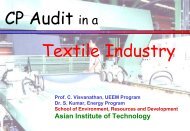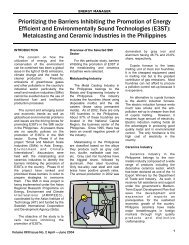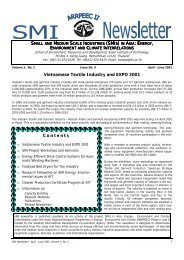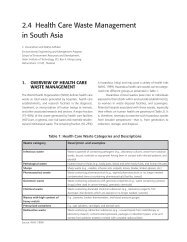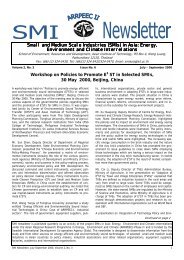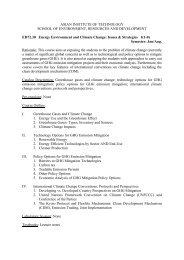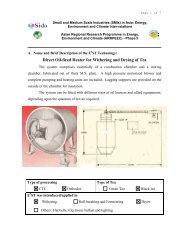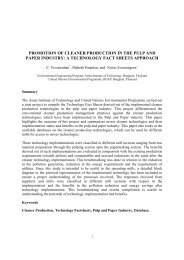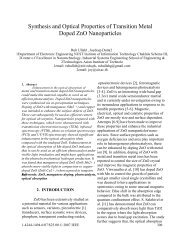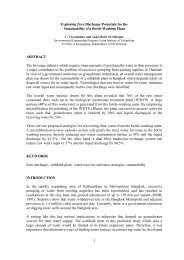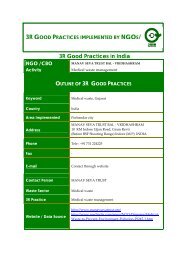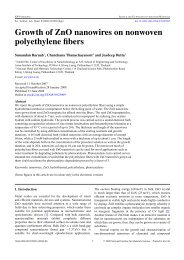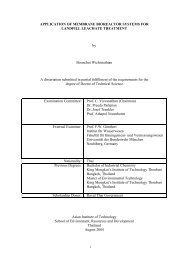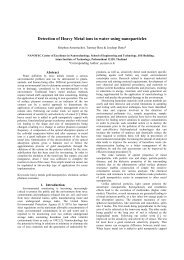A Gap Analysis in Selected Asian Countries, 3R Knowledge Hub ...
A Gap Analysis in Selected Asian Countries, 3R Knowledge Hub ...
A Gap Analysis in Selected Asian Countries, 3R Knowledge Hub ...
Create successful ePaper yourself
Turn your PDF publications into a flip-book with our unique Google optimized e-Paper software.
60<br />
<strong>3R</strong> <strong>Gap</strong> <strong>Analysis</strong> and F<strong>in</strong>d<strong>in</strong>gs<br />
Heap of Urban Refuse, Bandung City<br />
Image source: Muhammad Zakaria, <strong>3R</strong>KH<br />
Inception Workshop, Hanoi 2007<br />
Organic Waste Management <strong>in</strong> Surabaya<br />
Municipal Waste Composition - Indonesia<br />
Source: www.3rkh.net<br />
The daily waste generation <strong>in</strong> Surabaya city is around 1630 ton and a major portion is from household<br />
units which contribute around 56% organic waste. The foremost challenge <strong>in</strong> Surabaya City is <strong>in</strong><br />
implement<strong>in</strong>g <strong>3R</strong>. Recycl<strong>in</strong>g has been carried out by scavengers, which has often led to exposure of solid<br />
waste on streets and sanitation problems. Normally, scavengers reduce solid waste volume by almost<br />
30% <strong>in</strong> Surabaya, which greatly reduces costs of transportation and disposal downstream. So there is an<br />
emerg<strong>in</strong>g need to manage an efficient recycl<strong>in</strong>g system <strong>in</strong>volv<strong>in</strong>g the scavenger labor force.<br />
Another obvious challenge for Surabaya is the large gap between <strong>in</strong>come and expenses <strong>in</strong> solid waste<br />
management. Semi-sanitary landfills, compost<strong>in</strong>g and small scale <strong>in</strong>c<strong>in</strong>eration have been the key<br />
components <strong>in</strong> the f<strong>in</strong>al treatment. Expenses are subsidized from other sources such as tax and other city<br />
revenue. Appropriate strategies have been envisaged to ensure participation and <strong>in</strong>volvement of the<br />
community, which, <strong>in</strong> turn, promotes self-development of the community itself. However, law and<br />
regulations must be improved together with human resources <strong>in</strong> order to facilitate effective<br />
management. Furthermore, due to a lack of <strong>in</strong>stitutional framework and rules and regulations, private<br />
sector participation <strong>in</strong> solid waste management is limited. The crucial <strong>in</strong>novative strategy from Surabaya<br />
is the “Kampung Improvement Programme (KIP)” and “Comprehensive Kampung Improvement<br />
Programme (C-KIP)”, with the focus on empower<strong>in</strong>g local communities to solve their own problems <strong>in</strong><br />
solid waste management with the support from the local government and professionals. In this<br />
arrangement, local communities are responsible for solid waste management <strong>in</strong> their neighborhood.<br />
Under this arrangement, households pay transport and disposal charges for solid waste management to<br />
the city government, either through water bills or at the subdistrict level.<br />
Source: Solid Waste Management Sem<strong>in</strong>ar Kitakyushu, September 2002.<br />
There has been a significant progress <strong>in</strong><br />
Indonesia with respect to solid waste<br />
management and <strong>3R</strong> implementations,<br />
especially <strong>in</strong> agro-<strong>in</strong>dustries.<br />
• Slaughter House - compost, biogas &<br />
methane capture - electricity<br />
• Milk Industries - compost<br />
• Sugar Plant - compost, bio-fuel<br />
• Palm Industries - compost, bio-fuel, Forestry<br />
and Horticulture - bio-fuel<br />
The Compost Subsidy Project <strong>in</strong> 19 cities has<br />
proved to be successful, especially <strong>in</strong> Bandung<br />
city. The municipalities <strong>in</strong> Bandung city have<br />
put forward a plan to implement <strong>3R</strong> <strong>in</strong>itiatives<br />
<strong>in</strong> manag<strong>in</strong>g their solid waste problem. Prior to<br />
landfills, the collected waste would pass<br />
through temporary treatment sites, one at the<br />
community level and the other at the city level.<br />
These treatment sites will segregate the organic<br />
waste for compost<strong>in</strong>g and <strong>in</strong>organic materials<br />
for recycl<strong>in</strong>g. The residues would be sent either<br />
for further treatment or landfill<strong>in</strong>g. Residential<br />
areas, markets, offices and transportation<br />
term<strong>in</strong>als have been identified as ma<strong>in</strong> sources<br />
of waste generation. The <strong>3R</strong> approach would be<br />
channelled from Local Community to NGO to<br />
the Government (Local–Prov<strong>in</strong>cial– Central).



